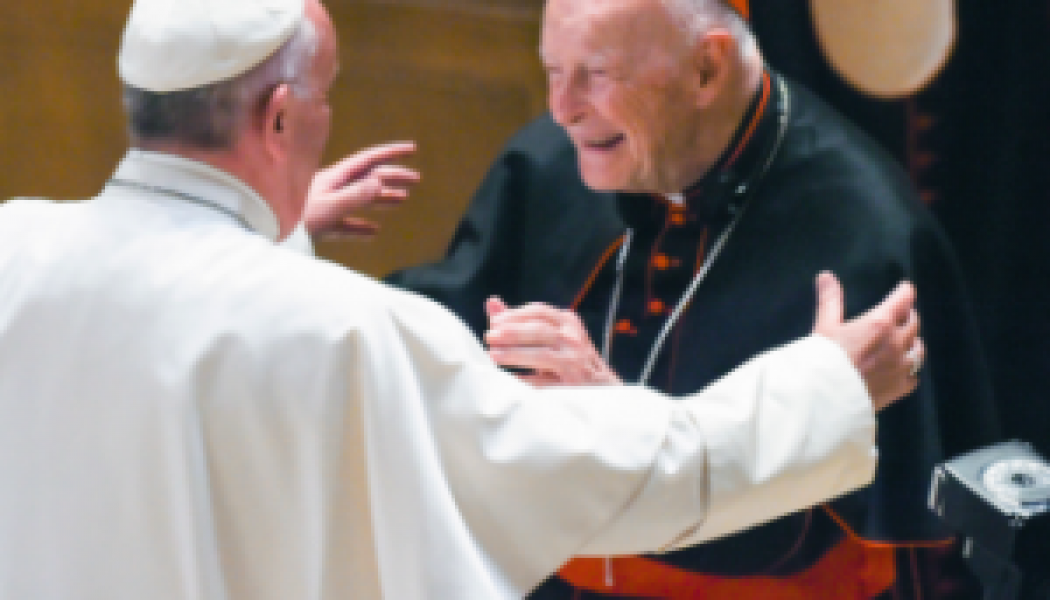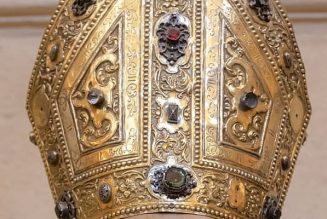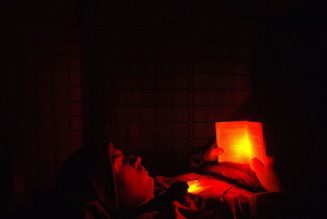
> Italiano
> English
> Español
> Français
> All the articles of Settimo Cielo in English
*
There are at least three lessons to be drawn from the 461 pages of the “Report” on the case of former Cardinal Theodore McCarrick published on November 10 by the Vatican secretariat of state:
The first lesson is the inadequacy of the response from Church authorities – including the last three popes – to the buildup of accusations against McCarrick.
These are accusations that cover a span of decades. But it was only in June 2017, with the first public charge of having abused a minor, that the canonical process and sentence were triggered.
All the previous accusations concerned sexual acts with youths and adults, all of them male. Acts that McCarrick, during his years as bishop of Metuchen and then of Newark, presented to his prey – as the “Report” reads – as “something normal and accepted in the United States,” especially if “between priests.”
Evidently even for the ecclesiastical authorities the gravity of those acts was not judged to be such as to require an immediate and rigorous ascertainment of the truth of the accusations.
Distinguishing himself in the opposite direction was Cardinal John J. O’Connor (1920-2000), archbishop of New York, who in an October 28 1999 letter to the Vatican authorities sounded the loudest call of alarm over the real gravity of the accusations against McCarrick.
O’Connor’s letter reached Pope John Paul II and had the effect of blocking McCarrick’s promotion to archbishop of Washington, as had happened shortly before, for the same reasons and again under pressure from O’Connor, for the sees of Chicago and New York.
But suddenly, in the summer of 2000, John Paul II changed his position and installed McCarrick in Washington. Without a doubt the reason for this about-face was a letter from McCarrick to the pope’s secretary, Stanislao Dziwisz, in which he avowed that he had “never had sexual relations with any person, male or female, young or old, cleric or lay.” But the “Report” also states that “it seems likely that John Paul II’s experience in Poland of false accusations being brought against bishops in order to undermine the role of the Church inclined him to give credence to McCarrick’s denials.”
In 2001, McCarrick was also made a cardinal. And as vicar general of his diocese of Washington he had beside him for almost six years, Kevin Farrel, who would later say that he had never seen “a single indecent gesture” from his superior, but only that he had heard “old rumors” against him that in any case “did not concern sexual activity.” And this in spite of the fact that during those same years – news that could not have slipped by – the two dioceses of Metuchen and Newark of which McCarrick had previously been bishop had paid tens of thousands of dollars to settle disputes with former priests who had charged him with having sexually abused them. According to the “Report,” McCarrick himself contributed ten thousand dollars to the sum paid by the diocese of Metuchen.
Shortly after his election as pope in 2005, Benedict XVI instead considered the accusations sufficiently “credible” to ask McCarrick to “spontaneously” resign as bishop of Washington by Easter 2006, at the age of 75. Which happened. In addition, McCarrick was asked by the cardinal prefect of the congregation for bishops at the time, Giovanni Battista Re – verbally in 2006 and in writing in 2008 – to “keep a low profile and reduce travel to a minimum.”
Benedict XVI however ruled out the opening of a formal canonical process against McCarrick to determine whether the accusations were true or not, as had been suggested by the secretariat of state with two “Memos” in 2006 and 2008 by the delegate for pontifical representations at the time, Carlo Maria Viganò.
The result was that in the absence of canonical sanctions McCarrick continued carrying out his public activities as before, including countless trips.
And this kept going on non-stop during the first years of Francis’s pontificate, who was given no specific documentation on the accusations – the “Report” states – which the new pope “believed had already been examined and rejected by John Paul II.”
It was only after in June 2017 – as has been said – McCarrick was accused of having abused a victim under the age of 18 that Pope Francis dismissed him as cardinal, had him found guilty by the congregation for the doctrine of the faith with administrative criminal proceedings, and finally reduced him to the lay state.
*
The second lesson concerns McCarrick’s extraordinary “success” both inside and outside the Church, despite the accusations against him and the request that he retire to private life.
The fellow was unbeatable as a fundraiser. Starting in his youth he had created a fruitful network of friendships with wealthy benefactors, whose children he called “nephews” and had them call him “Uncle Ted,” a moniker he passed on to the seminarians and young priests made the object of his homosexual practices.
He founded and directed the Papal Foundation and was always very generous in giving gifts to high-ranking clergymen, although the “Report” rules out that these donations had any real influence his career and those of his proteges, for example on the appointment of Blase Cupich as archbishop of Chicago.
He traveled all over the world, almost always on behalf of religious and secular institutions such as the episcopal conference of the United States, the American state department, the Holy See, Catholic Relief Service. He toiled for dialogue with Islam, with Judaism, with China. In Cuba he was a key figure in Barack Obama’s strategy of détente with the Castro regime.
The “Report” states that “McCarrick never acted as a diplomatic agent of the Holy See, nor with any official mandate from the secretariat of state.”
However, the same “Report” lays out the repeated contacts between McCarrick and cardinal secretary of state Pietro Parolin up to the end of 2016, on Cuba, China, and the Middle East. In the summer of 2014, during the run-up to McCarrick’s umpteenth trip to China, secretary for relations with states Dominique Mamberti said he was “completely opposed to favoring any initiative in China” by the cardinal, but his superior Parolin still wanted to use him as an “alternative channel,” “adhering to the diplomatic precept that it is better to promote dialogue and never to close a door.”
In 2016, before another trip by McCarrick to China, when Parolin pointed out to him that “he keeps writing, keeps traveling, keeps meeting with people,” Pope Francis replied that “perhaps McCarrick could still do something useful.”
In short, thanks to this formidable network of contacts at the highest levels, to these international initiatives, to ties with influential bishops and cardinals even though they knew about – or suspected – his homosexual activity, McCarrick believed himself practically unassailable. And he was not afraid to violate with impunity until the end that “low profile” which had not been imposed on him, but only timidly requested.
*
The third lesson has to do with the great accuser Carlo Maria Viganò. And it is a disastrous lesson for him, according to what the “Report” documents.
Viganò was apostolic nuncio to the United States from 2011 to 2016 and in all those years – in contrast with what he had written in his demanding “Memos” of 2006 and 2008 – he repeatedly demonstrated to McCarrick, both in public ceremonies and in private meetings and exchanges of letters, a proximity that was warm at times, with courteous exchanges of information before and after the cardinal’s frequent trips.
In the summer of 2012, after Viganò had informed cardinal prefect of the congregation for bishops Marc Ouellet of a detailed new accusation against McCarrick, and after Ouellet had ordered him to proceed with an immediate verification of the facts by questioning both the cardinal and his accuser and other witnesses, the nuncio did none of this, nor did he obtain the related documentation, with the result – as the “Report” states – that “the civil complaint describing in detail three sexual episodes with McCarrick was not received by the nunciature or by the Holy See until the end of 2018,” that is, four years later and by other means.
It goes on. The “Report” states that Viganò left the bishops of the United States in the dark about the “low profile” that McCarrick was supposed to keep, as confirmed by Archbishop Joseph E. Kurtz, who presided over the episcopal conference during those years.
As for Pope Francis, the “Report” confidently states that “before the accusation [of child abuse] presented to the archdiocese of New York in 2017, the pope had never been informed by anyone that McCarrick had sexually abused or attacked some person, regardless of the age of the latter, […] nor did he ever see until after August 2018”the 2008 letter in which Cardinal Re asked McCarrick to lead a retired life.
This contrasts head-on with Viganò’s statement of August 22 2018, his call for Francis to resign, in which he claimed to have spoken about the McCarrick case with the pope on June 23 2013, in these terms:
“‘Holy Father, I don’t know if you know Cardinal McCarrick, but if you ask the Congregation for Bishops there is a dossier this thick about him. He corrupted generations of seminarians and priests and Pope Benedict ordered him to withdraw to a life of prayer and penance.’ The Pope did not make the slightest comment about those very grave words of mine and did not show any expression of surprise on his face, as if he had already known the matter for some time, and he immediately changed the subject.”
The “Report” not only rejects this version of the facts, but points out that Viganò reported to Cardinal Re and another interlocutor on his meeting with Francis “enthusiastically, […] as if he considered him an ally” in the battle against corruption.
Furthermore, the “Report” indicates that ten days before the meeting with the pope on June 23, Viganò had written to Cardinal Ouellet, prefect of the congregation for bishops, to inform him – without any comment from him – that the civil action against McCarrick undertaken by the accuser who had taken the field in 2012 had been rejected and could no longer be re-proposed, and to send him two letters from Metuchen bishop Paul Bootkoski that dismissed the accuser’s complaints as “false and scandalous.”
In June of 2016, when Christophe Pierre took over from Viganò as nuncio to the United States – the “Report” goes on – “his predecessor did not provide him with any information, neither verbally nor in writing, relative to McCarrick.”
Also inconsequential, according to the “Report,” were several remarks on the McCarrick case made to Francis between 2013 and 2016 by then-substitute Giovanni Angelo Becciu and by Cardinal Parolin, which the pope acknowledged as “dating back to the distant past” and on which “there had been chatter,” seen as “baseless” by John Paul II before him.
Viganò immediately replied to the “Report” with a brief indignant statement, which certainly will not be the last of the series. And “l’intendance suivra.”
.
Join Our Telegram Group : Salvation & Prosperity








